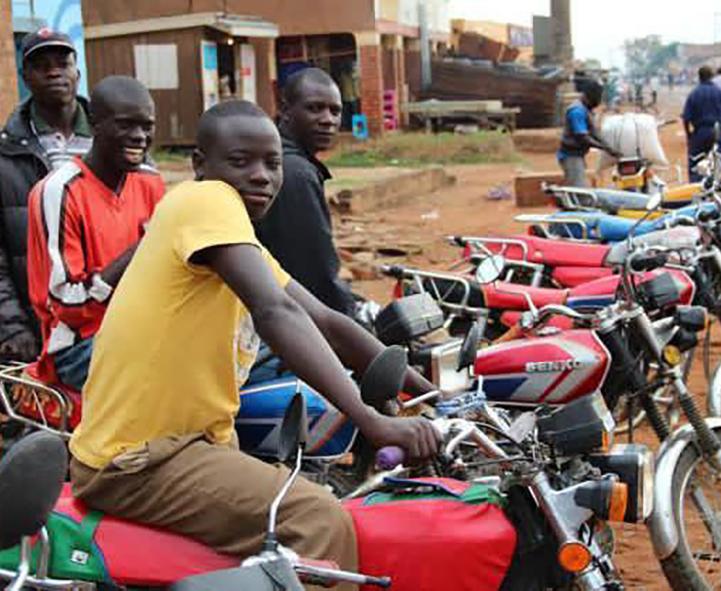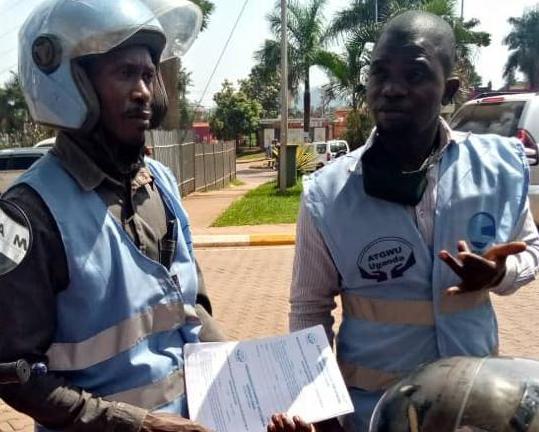
6 minute read
Responding to the crisis and beyond: what are the challenges and opportunities?
COVID-19 EXPOSES A BROKEN SYSTEM
The Covid-19 crisis has once again laid bare the vulnerabilities of the millions who earn a livelihood in the informal economy, and serves as a reminder of the crucial need to make the transition from the informal to the formal economy a priority area in national policies.’
ILO. 2020. Brief: COVID-19 Crisis and the Informal Economy, p8
The Covid-19 crisis has shone a light on the extreme vulnerability and precariousness of workers in the informal economy and the huge numbers of people dependent on informal work for their livelihoods. It has also compounded existing patterns of exploitation and exacerbated existing economic and gender inequalities.
The problems associated with informal passenger transport are well-known: oversupply and poor maintenance of vehicles, chronic traffic congestion, pollution, poor services for passengers, and violence and corruption. Informal transport workers work long hours for low pay and face appalling working conditions, while women workers often find themselves in the lowest paid and most precarious jobs of all, such as cleaning and food vending.
The industry is driven by the so-called target system, where vehicle crews, including motorcycle taxi riders, have to pay owners a fixed daily or weekly hire fee (the target) to operate the vehicle. In many cities, the vehicle owners have powerful interests, including in government, the police and the military. The target system results in extremely long working hours, aggressive driving, high accident rates, poor and very precarious livelihoods for the workforce, and a low quality service to passengers. The industry is also a major source of carbon emissions. The threat of climate change is therefore increasing pressure on governments to take radical action to remove hundreds of thousands of old, badly maintained and polluting vehicles from the streets.
Despite the problems associated with the informal transport industry, in cities where formal employment is scarce informal transport services provide much-needed jobs for millions of workers across the global South, and cheap and flexible transport for the millions more passengers who rely on the services.
PRIVATE CAR OWNERSHIP
Private cars are a fundamental cause of congestion and environmental degradation. Informal transport systems (such as minibuses and taxis) are frequently blamed by the authorities and the media, but the major underlying problem for passenger transport is the dramatic rise in private car ownership. The pandemic is fuelling the trend towards cars as public transport capacity is reduced by safe distancing and passenger fear of infection.
Passenger numbers are in freefall, and some operators have had to suspend fare payments as a way to limit interactions between staff and passengers. Transit agencies that were already underfunded are seeing their revenue plummet. Even after the lockdowns come to an end, health concerns could cause people to favour private cars over public transport.’
World Bank. Earth Day 2020. Could COVID-19 Be the Tipping Point for Transport Emissions? April 22, 2020
An obvious solution is to restrict private car ownership or ban private cars from city centres but few governments or city authorities are prepared to take the political risk of alienating the expanding car-owning middle classes.
This is a threat for all public transport workers, not just those in the informal economy, as well as a step backwards in the reduction of congestion and emissions.
AN OPPORTUNITY FOR WORKER-LED FORMALISATION
The pandemic emergency provides an important opportunity for unions and associations representing informal transport workers to campaign for and negotiate practical reforms that can improve the quality, efficiency and environmental sustainability of the industry alongside the livelihoods and working conditions of the workforce.
In effect, there is an opportunity for worker-led formalisation of urban passenger transport aimed at creating quality public transport for both passengers and workers and building a ‘gender equal new normal’ in the transport industry itself.
The crisis has led many city leaders who formerly argued for minimum government involvement to now embrace state intervention. There is increasing recognition that public transport can no longer be exclusively financed by passenger fares and will require direct public investment.
Governments and unions therefore find themselves in agreement in recognising the need for a radical transformation of the informal transport industry and the formalisation of labour within it. The challenge for unions now is to ensure that this transformation and formalisation process is shaped by informal transport workers themselves. This reflects the rallying call of informal workers worldwide: ‘Nothing for us without us!’
THE WORLD BANK
The World Bank continues to wield considerable influence over urban transport policy throughout the global South, through advice to governments and loan conditions. However, past experience shows that measures protecting informal workers are of secondary importance at best in projects supported by the World Bank, and its recommended privatisation of public transport services rarely benefits lowincome workers and users.
Nevertheless, it is a large institution with internal policy contradictions and is frequently inconsistent. Some recent statements and reports in the context of Covid-19 provide arguments that can be useful for unions when negotiating with national governments.
A World Bank report in August 2020, for example, recognised that:
Rapid and comprehensive support to the public transport sector in African cities is critical to avert massive job losses, prevent the disruption of public services which can aggravate the social exclusion of vulnerable populations; and avoid further hampering the efficiency of cities. A quick response targeting the informal sector is needed to avoid massive layoffs and a potentially drastic reduction in public transport supply.’
World Bank/SSATP. Urban Mobility and Covid-19 in Africa, August 2020
The same report called for ‘immediate financial support to public transport companies, with a focus on informal operators, including but not limited to subsidies to individual informal operators through associations or unions under specific conditions, tax or license payment waivers targeting formal and informal operators and subsidies to informal transport operators to compensate for losses incurred as a result of restrictions (i.e. limited load capacity)’.
In the medium term, it recommends that governments ‘consolidate, formalize and structure the informal sector to increase resilience’, including setting up basic social safety nets to protect workers and ‘corporatizing informal operators to professionalize transport operations and boost resilience’.9
GOVERNMENTS ARE ADOPTING ‘SHOCK THERAPY’
In some cases it appears that city authorities and governments are taking advantage of Covid emergency measures to impose major permanent reforms of informal transport operations. They are using the ‘shock’ of Covid to push through changes that will have a dramatic impact on jobs and livelihoods without proper negotiation or consultation with workers.
Governments are also using state of emergency legislation to clamp down on the right to protest during the pandemic. For example, the South African government imposed a national state of disaster in March 2020 and has banned the right to meet, demonstrate and physically picket.10
Governments who have introduced wholesale bans on informal bus or motorcycle taxi operations may be tempted to make some new regulations permanent. In Kampala, Uganda, for example, the authorities proposed a complete permanent ban on boda-boda motorcycle taxis in the city centre. With pressure from Amalgamated Transport and General Workers Union (ATGWU) and its boda boda associations the authorities agreed to revisit this position and other reforms in order to get workers’ involvement. There is little recognition that there needs to be a ‘just transition’ towards the formalisation and environmental sustainability of public transport. National and city governments continue to push through draconian laws and regulations from above, without consultation.
Where views of representatives of the informal industry are sought by the authorities, these are nearly always groups claiming to represent vehicle owners or employers. Workers and democratically elected unions or associations are rarely represented.
Some of the reforms being considered or introduced will deepen inequality, locking in new transport systems that will not benefit the majority of workers or passengers.
Boda boda drivers in Kampala







